Categories and awards
The EU organic awards comprise 7 awards across 6 different categories. They acknowledge different actors along the organic value chain that have developed an excellent, innovative, sustainable, and inspiring project producing real added value for organic production and consumption.
The inaugural EU organic awards took place in 2022. Be inspired by previous winners.
The applications for the fourth edition will open on 11 February 2025. You can preview the questions in the application forms, to help the jury obtain more information about the applicants.
 Category 1: Best organic farmer (female) and Best organic farmer (male)
Category 1: Best organic farmer (female) and Best organic farmer (male)The objective of this award is to reward a farmer (one female and one male). This award is organised by COPA-COGECA and IFOAM Organics Europe.
Specific attention will be paid to young farmers’ projects in order to increase their visibility, by showcasing their projects and highlighting their relevance (young farmers are defined as farmers that are maximum 40 years old (at the time of the deadline for the submission of applications).




 Category 6: Best organic restaurant/food service
Category 6: Best organic restaurant/food service
Applications
Reasons to apply
Do you want to contribute to the greater public awareness of organic production in the EU? Do you want to contribute to the greater affordability and/or accessibility of organic products in the EU? Have you developed and implemented, or are you still implementing, an excellent, innovative, sustainable, and replicable project for this purpose? Would you like to increase public awareness of the project?
If the answer to any of the above questions is 'yes', you should consider entering for the next edition of the EU organic awards. If you win, you will receive a non-financial recognition award and greater public visibility for your project. So, whether you are:
- an organic farmer
- a city or region serving organic meals to patients or pupils or otherwise promoting organic production
- a business in the organic food chain with a unique approach
- you should think about entering the EU organic awards.
Application process
Applicants for the 2025 EU organic awards are asked to:
- read the different sections of this website, in particular the eligibility criteria and the selection criteria;
- choose the award category they wished to enter;
- apply online from 11 February until 27 April 2025 23:59:59 CEST;
- provide answers to closed guiding questions (some relating to the four principles of organic and the sustainability pillars), to help the jury to obtain more information about the applicants.
Any actor or institution along the organic value chain with a noteworthy project contributing to the greater affordability and/or accessibility of organic products in the EU can apply. Project promoters must be established or residents in the EU. Applications must be submitted in one of the official EU languages and the projects EU based.
Applications for the EU Organic Awards must meet the following eligibility criteria:
a) The starting point to apply for one of the awards is the EU organic awards webpage, which links to the online application forms for each of the awards during the required period. Applications must be submitted by 27 April 2025, 23:59:59 CEST at the latest.
Only complete applications (all sections filled in) submitted via the online platform by the deadline will be considered once the application period closes.
b) Applications must be in one of the official EU languages.
c) Applicants must be legal or natural persons established or resident in one of the 27 Member States of the EU.
d) The project submitted must be EU based and refer clearly to one of the 6 award categories/7 awards. The same project cannot be submitted for several award categories/awards. Each applicant can only apply for one single award. The maximum number of applications per award is one.
e) The winners of the previous editions cannot re-apply for the 2025 edition. The non-winning finalists of the previous editions can re-apply for the 2025 edition.
f) The project should either have been fully implemented already or be in a sufficiently mature state so as to enable the jury to assess it (i.e. physical implementation should be advanced enough to demonstrate the achievement of the objectives).
g) Specific eligibility criteria for each award category:
- Best organic farmer (female) and Best organic farmer (male): Certified accordingly to the Regulation (EU) 2018/848 of 30 May 2018 on organic production and labelling of organic products and repealing Council Regulation (EC) No 834/2007;
- Best organic region/bio-district: A ‘bio-district’ is defined as a geographical area where farmers, the public, tourist operators, associations and public authorities enter into an agreement for the sustainable management of local resources, based on organic principles and practices. Organic region has no specific eligibility criteria;
- Best organic city: No specific eligibility criteria; in case the city operates one or more organic farms or stores, proof of their organic certification must be provided. This proof must be a valid certificate at the moment of submission;
- Best organic food processing SME: Enterprise certified according to Regulation (EU) 2018/848, and having 100% organic production and complying with the SME definition (an enterprise that employs fewer than 250 persons and has an annual turnover not exceeding EUR 50 million, and /or an annual balance sheet total not exceeding EUR 43 million). Cooperatives can be understood as enterprises. Processing is understood as defined by Regulation (EU) No 852/2004;
- Best organic food retailers: Enterprise certified according to Regulation (EU) 2018/848 and having 100% organic certified references on sale (excluding non-food products or food products for which there is no organic availability) and complying with the SME definition (an enterprise that employs fewer than 250 persons and has an annual turnover not exceeding EUR 50 million, and/or an annual balance sheet total not exceeding EUR 43 million). Cooperatives can be understood as enterprises;
- Best organic restaurant/food service: Enterprise having 100% organic certified references in their menu, where possible and complying with the SME definition (an enterprise that employs fewer than 250 persons and has an annual turnover not exceeding EUR 50 million, and/or an annual balance sheet total not exceeding EUR 43 million). Cooperatives can be understood as enterprises.
All eligible applications will be assessed by the EU Organic Awards jury against the following horizontal award criteria:
- Excellence: The awardee must have developed an excellent initiative producing real added value for organic production. This means good results and impact of the project in relation to its initial objectives. Projects shall demonstrate their impact on the area and territory concerned and show their results against the initially set targets and objectives.
- Innovative character of the project in the selected award category: Projects shall not be "business as usual", but should demonstrate new approaches, new organisational methods, or the development of new (or significantly) improved results for organics. The criteria for measuring the innovative character for each category are better detailed in the dedicated section of the category.
- Sustainability pillars (environmental, social and economic) of the project: Projects shall demonstrate their sustainability and their future as a self-standing initiative or project detailing how their project meets each pillar of sustainability in 3 different sub-sections.
- Transferability and possibility to replicate the project elsewhere in the EU: The project shall demonstrate that it represents good practice in a wider (EU) context and that it inspires or could inspire other places. The project should also show good ways of communicating its goals and results.
- Young farmer (category 1): in order to give more visibility to young farmers, in case of equivalent points in the final scoring, preference will be given to farmers who are maximum 40 years old.
The applicants will be asked guiding questions, developed in relation to the four principles of organic agriculture and the sustainability pillars, as well as a project summary. These questions helped the applicants to better structure their answers and the jury to obtain more data about the applicants.
Timeline
- 11 February 2025
Launch of the application period for the awards
- 27 April 2025
Deadline for the submission of applications: 27 April 2025, 23:59:59 CEST.
- June 2025
Awards evaluation decision
- 23 September 2025
Awards ceremony
Be inspired by the winners
Meet the winners of the 2022, 2023 and 2024 editions. Watch the full recording of the third EU organic awards ceremony that took place in Brussels
The third awards ceremony was organised on 23 September 2024, as one of a range of activities and events to mark EU organic day. The winners were invited to an event in Brussels to collect their awards. This event involved representatives of the European Commission, the European Parliament, the Council of the European Union, the European Economic and Social Committee, the Committee of the Regions, COPA-COGECA and IFOAM Organics Europe.

- News article
The Commission announced today the eight winners of the third edition of the EU Organic Awards.
Best organic farmer (female)
Winner
- Nazaret Mateos Álvarez (Entresetas) – Paredes de Nava, Palencia, Spain
Finalists
- Katharina Lichtmannsperger (VLG Obervetterbachgut) – Thalgau, Salzburg, Austria
- Sara Vezza (Azienda Agricola Sara Vezza) – Localitá Castelletto, Monforte d’Alba, Piemonte,Italy
Best organic farmer (male)
Winner
- David Pejić (Zrno eko imanje) – Dubrava, Zagreb County, Croatia
Finalists
- Gianpaolo Mancini (Il Sentiero del Riccio) – Sicignano degli Alburni, Salerno, Campania, Italy
- TomKass (Kass-Haff S.àrl) – Rollingen, Luxembourg
Best organic region
Winner
- Occitanie, France
Finalists
- Centre-Val de Loire, France
- Comunitat Valenciana, Spain
Best organic city
Winner
- Gemeinde Seeham am Obertrumer See, Salzburg, Austria
Finalists
- Municipality of Troyan, Bulgaria
- Stadt Wien, Austria
Best organic bio-district
Winner
- Associazione Bio-Distretto Cilento – Campania, Italy
Finalists
- Association Biovallée – Eurre, France
- Centro Municipal Cultura e Desenvolvimento de Ihanha-a-Nova – Centro region, Portugal
Best organic SME
Winner
- Goodvenience.bio GmbH – Magdala, Thuringia, Germany
Finalists
- Gino Girolomoni Cooperativa Agricola – Isola del Piano, Pesaro and Urbino province, Italy
- Labonca Biohof GmbH – Burgau, Styria, Austria
Best organic retailer
Winner
- La ferme à l’arbre de Liège – Lantin, Liège, Belgium
Finalists
- Ecoveritas SA – Barcelona, Spain
- Bio MERCATO, seiVital GmbH – Kempten, Bavaria, Germany
Best organic restaurant
Winner
- Lilla Bjers HB – Visby, Gotland Island, Sweden
Finalists
- Trattino – Lyon, France
- Restaurant Luftburg (Kolariks Freizeitbetriebe GesmbH) - Kolarik im Prater – Wien, Austria
Best organic farmer (female)
Winner
- Clara Benito Pacheco (Entrelobas) - Serrada de la Fuente, Spain
Finalists
- Małgorzata Pucer (Pasiekapucer) - Barciany, Poland
- Céline Clenet (La Casseline) - Cassel, France
Best organic farmer (male)
Winner
- Thomas Moschos (Moschos Farm) – Kastoria, Greece
Finalists
- Roberto Giadone (Natura Iblea) - Ispica, Sicily, Italy
- Mikhaylo Haliv (Tomelloso) - Ciudad Real, Spain
Best organic region
Winner
- Burgenland, Austria
Finalists
- Dordogne, France
- Centre-Val de Loire, France
Best organic city
Winner
- Stadt Wien, Austria
Finalists
- BioStadt Bremen, Germany
- Hajdúnánás, Hungary
Best organic “bio-district”
Winner
- Idanha-a-Nova, Beira Baixa, Portugal
Finalists
- Bio Região de S. Pedro do Sul, Viseu district, Portugal
- Biodistretto della Via Amerina e delle Forre, Civita Castellana, Italy
Best organic food processing SME
Winner
- The Merry Mill - Vicarstown, County Laois, Ireland
Finalists
- Fürstenhof GmbH - Finkenthal, Germany
- Ekološka kmetija Kukenberger – Trebnje, Slovenia
Best organic food retailer
Winner
- Gut Wulksfelde– Tangstedt, Hamburg, Germany
Finalists
- Valle y Vega Cooperativa Agroecológica de Granada - Churriana de la Vega, Andalucia, Spain
- NaturaSì Conegliano – Conegliano, Veneto, Italy
Best organic restaurant/food service
Winner
- Luftburg - Kolariks Freizeitbetriebe GmbH - Vienna, Austria
Finalists
- Trnulja Country Estate - Ljubljana, Slovenia
- Biohotel St. Daniel - Štanjel, Slovenia
Best organic farmer (female)
Winner
- Reinhild Frech-Emmelmann, Reinsaat GmbH, St. Leonhard am Hornerwald, Lower Austria, Austria
Finalists
- Blagovesta Vasilieva, The wild farm (ДИВАТА ФЕРМА), Gorno Pole, Eastern Rhodopes, Bulgaria
- Caroline Devillers, Bel Go Bio, Hollogne-sur-Geer, province of Liège, Belgique
Best organic farmer (male)
Winner
- Benny Schöpf, Kartoffelkombinat, München, Bavaria, Germany
Finalists
- Gianpaolo Mancini, Il sentiero del Riccio, Sicignano degli Alburni, Salerno, Italy
- Tommi Hasu, LuomuMattinen, Oravala, Kouvola, Finland
Best organic region
Winner
- South Savo, Finland
Finalists
- Comunidade Intermunicipal do Alto Tâmega e Barroso, Chaves, Portugal
- Comunidad autónoma de Castilla - La Mancha, Spain
Best organic city
Winner
- BioStadt Bremen, Germany
Finalists
- Cascais, Lisbon district, Portugal
- Las Rozas, Community of Madrid, Spain
Best organic “bio-district”
Winner
- Sörmland Bio-district, Sörmland, Sweden
Finalists
- Distretto del Cibo Monregalese – Cebano, Cuneo, Piedmont, Italia
- Bioregião de S. Pedro do Sul, Viseu district, Beira alta, Portugal
Best organic food processing SME (Small and Medium Enterprises)
Winner
- Gino Girolomoni Cooperativa Agricola, Isola del Piano, Montebello, Marche, Italy
Finalists
- Biologon GmbH, Hochfilzen, Tyrol, Austria
- Organic veggie food GmbH/SOTO organic specialities, Bad Endorf, Bavaria, Germany
Best organic food retailer
Winner
- SAiFRESC, Catarroja, Valencian Community, Spain
Finalists
- BIOGAST GmbH, Zwettl, Lower Austria, Austria
- Coolanowle Organic Meats, Ballickmoyler, County Laois, Ireland
Best organic restaurant/food service
Winner
- Kalf & Hansen, Stockholm, Sweden
Finalists
- B2 Bio pur GmbH, Binsdorf, Baden-Württemberg, Germany
- Biohotel St. Daniel, Štanjel, Primórska region, Slovenia


EU Organic Awards 2024The 2024 winners and representatives of the European Commission, the European Parliament, the Council of the European Union, the European Economic and Social Committee, the Committee of the Regions, COPA-COGECA and IFOAM Organics Europe. 

EU Organic Awards 2024A panel discussion with three of the winners: best organic city, best organic bio-district, and best organic region 
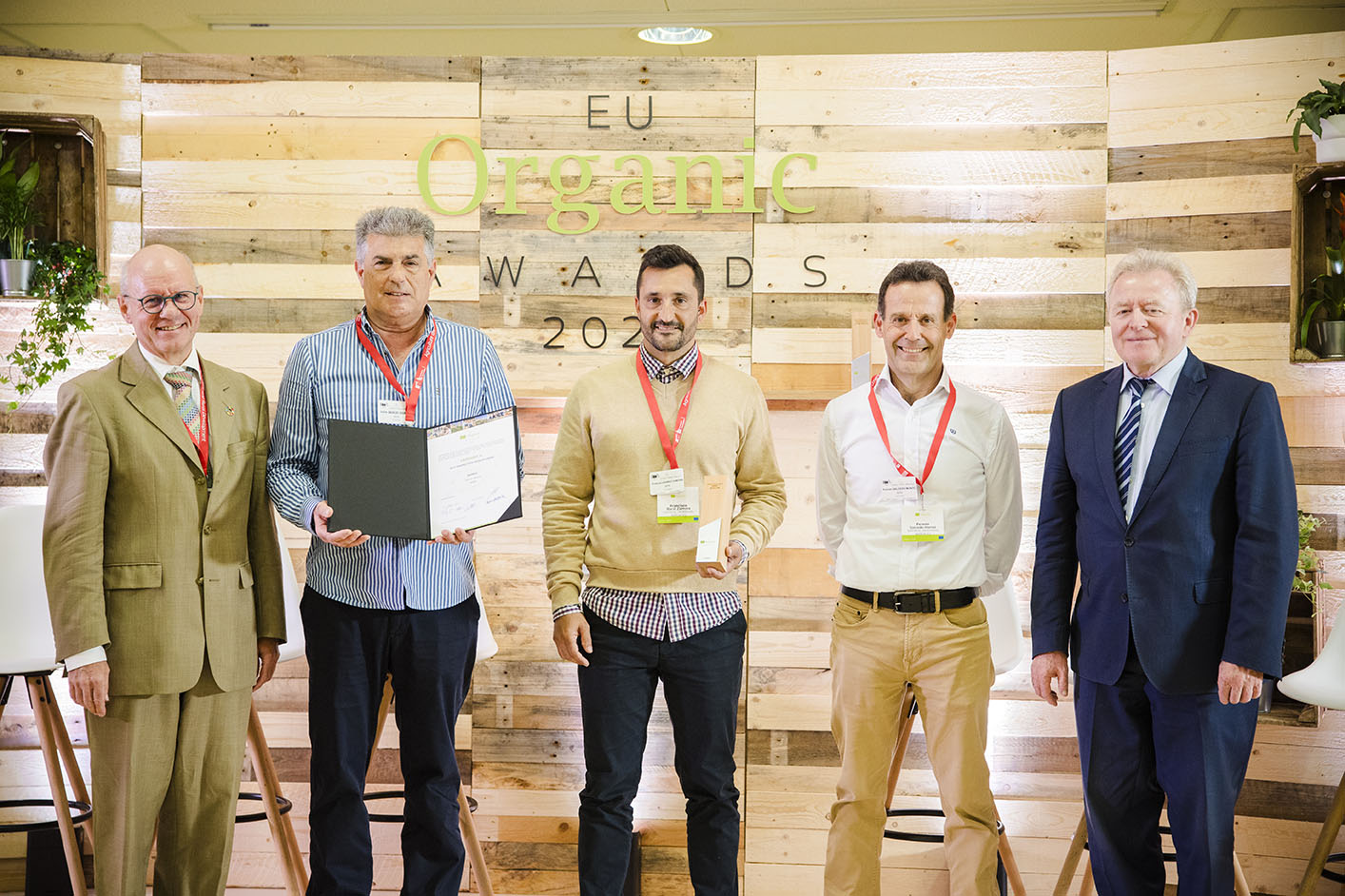
EU Organic Awards 2024 – Best organic food retailer SAiFRESC – Winner Mr Julio Quilis, Mr Fermin Salcedo and Mr Francisco Barat, with Mr Peter Schmidt (European Economic and Social Committee) and Commissioner Janusz Wojciechowski 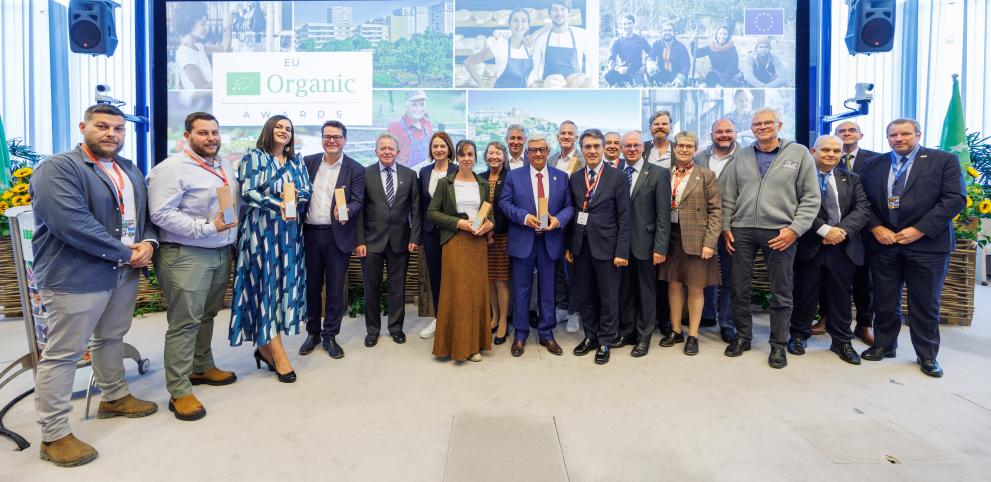
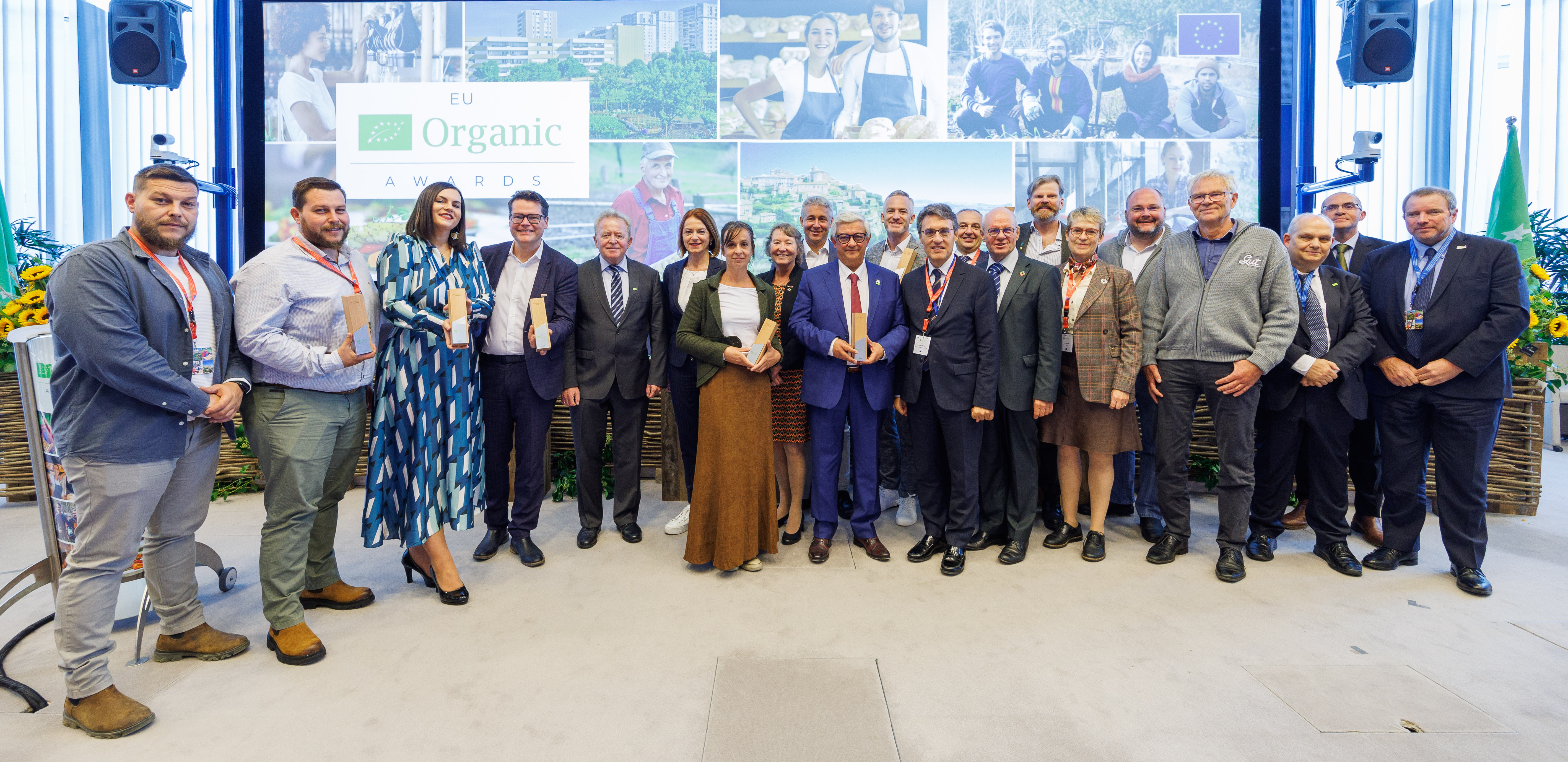
EU Organic Awards 2023The 2023 winners and representatives of the European Commission, the European Parliament, the Council of the European Union, the European Economic and Social Committee, the Committee of the Regions, COPA-COGECA and IFOAM Organics Europe. 

EU Organic Awards 20222022 EU Organic Awards winners with EU Commissioner for agriculture, Janusz Wojciechowski 
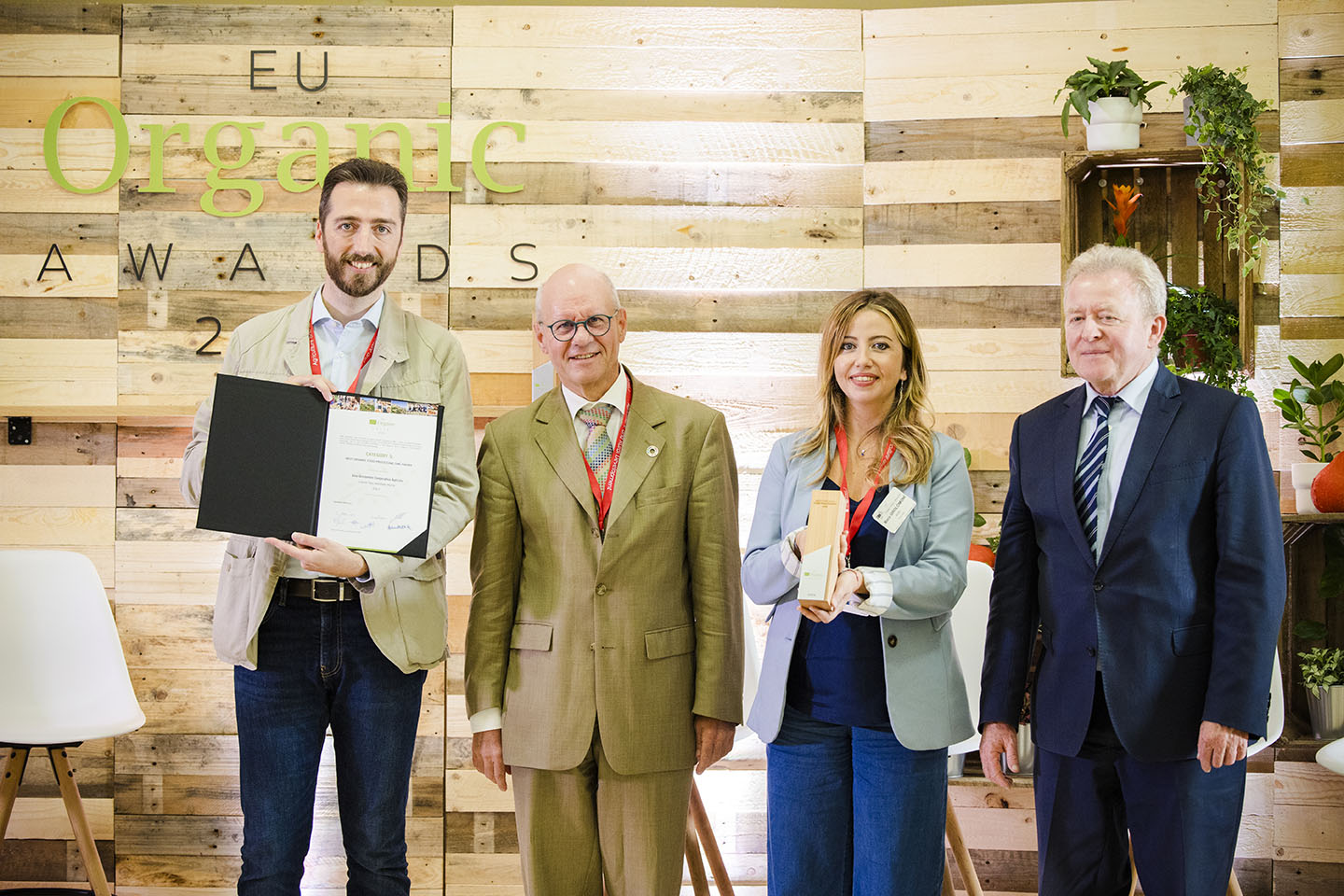
EU Organic Awards 2024 – Best organic food processing SME Gino Girolomoni Cooperativa Agricola – Winner Mr Giovanni Girolomoni and Ms Maria Girolomoni, with Mr Peter Schmidt (European Economic and Social Committee) and Commissioner Janusz Wojciechowski 

EU Organic Awards 2024 – Best organic farmerWinner Mrs Reinhild Frech-Emmelmann, and winner Mr Benny Schöpf with Mr. Jan Plagge, IFOAM Organics Europe's President 
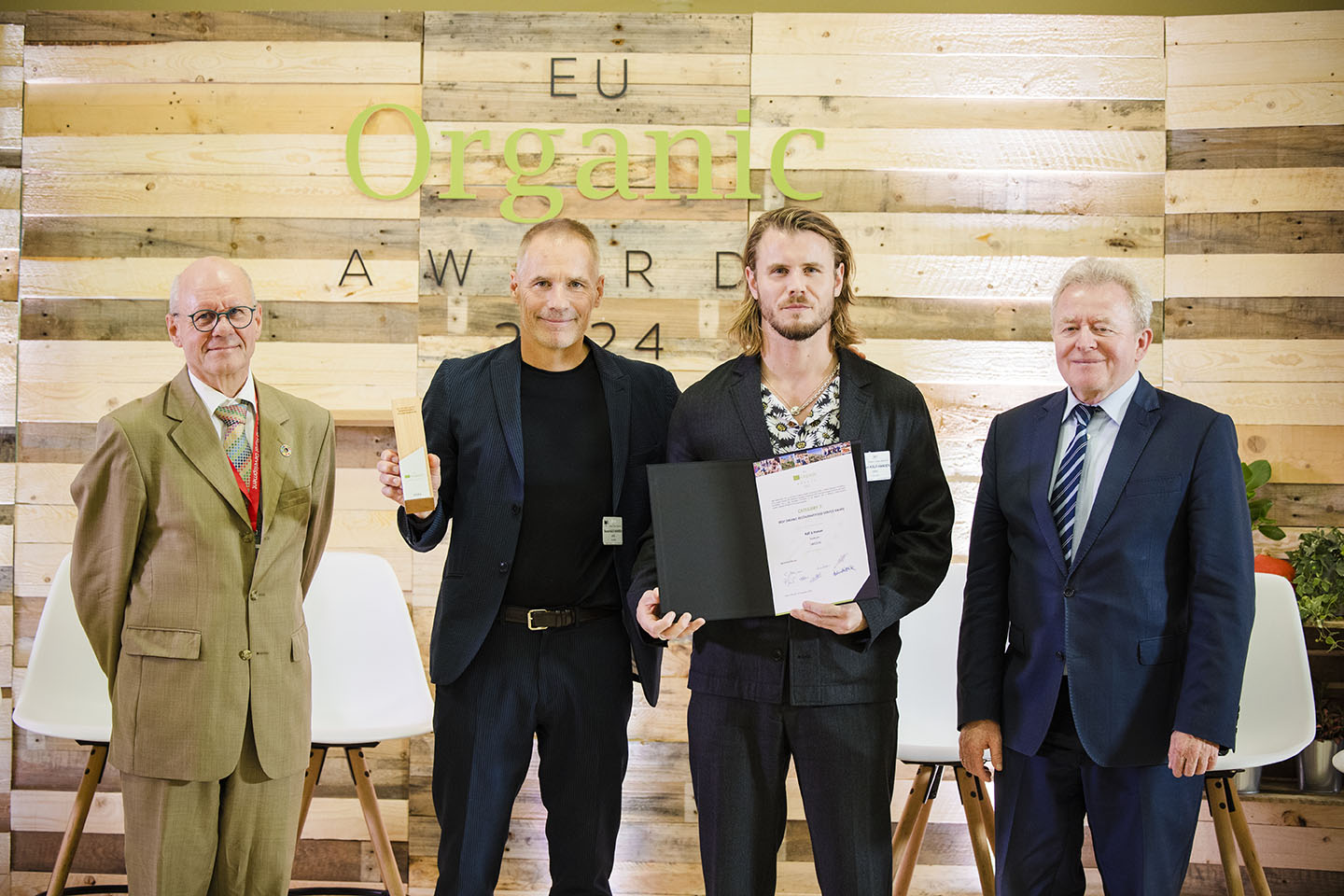
EU Organic Awards 2024 – Best organic restaurant/food serviceKalf & Hansen – Winners Rune Kalf-Hansen and Fabian Kalf-Hansen, with Mr Peter Schmidt (European Economic and Social Committee) and Commissioner Janusz Wojciechowski 
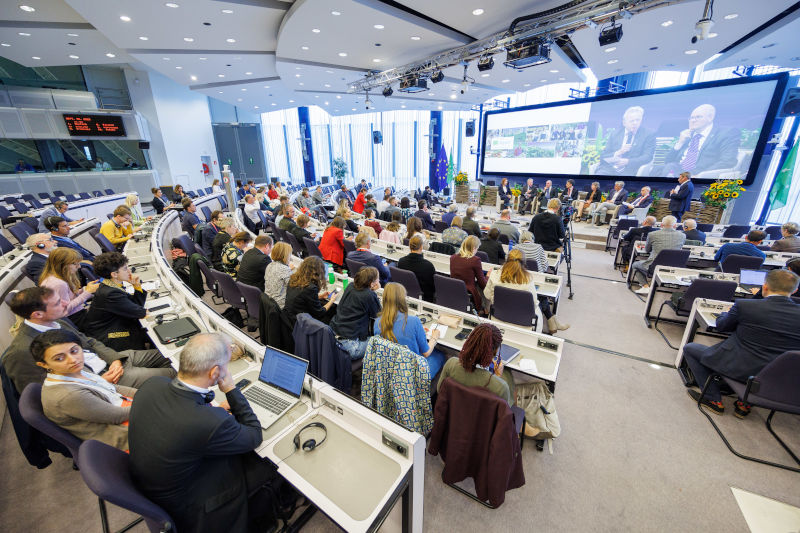
EU Organic Awards 2023Panel discussion 

EU Organic Awards 2023 winnersBest Organic City: Vienna, represented by Mr J. Czernohorszky, Best Organic Region: Regional Government of Burgenland in Austria represented by Mrs A. Eisenkopf, Best Organic Restaurant/Food Service: Luftburg - Kolarik im Prater represented by Mr Kolarik 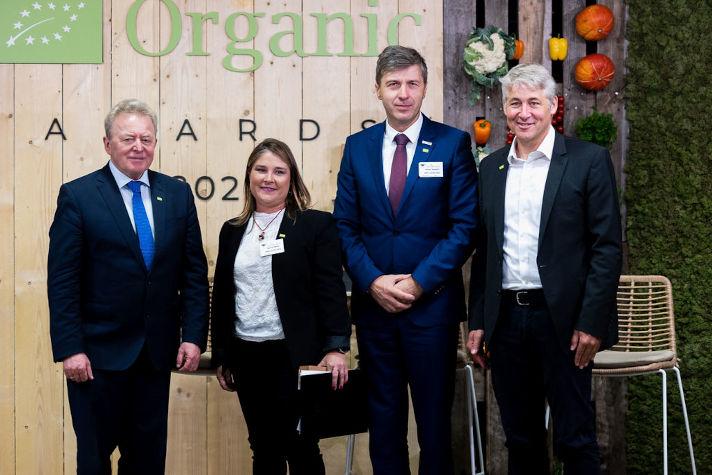

EU Organic Awards 2022 – Best organic farmer femaleNazaret Mateos Álvarez with EU Commissioner for agriculture, Janusz Wojciechowski 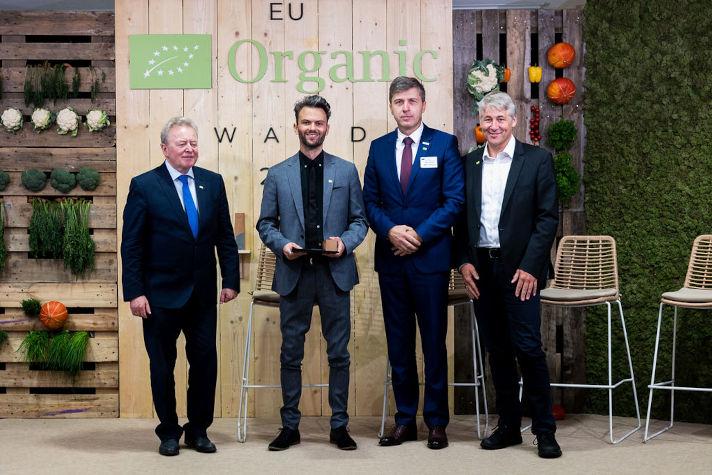

EU Organic Awards 2022 – Best organic farmer maleDavid Pejic with EU Commissioner for agriculture, Janusz Wojciechowski
About the EU organic awards
Increases in organic production contribute significantly to reducing the use of chemical fertilisers, pesticides and antimicrobials and have positive effects on our climate, the environment, biodiversity and animal welfare. That is why organic production has been identified as playing a key role in achieving the objectives of the European Green Deal, the Farm to Fork strategy and the Biodiversity strategy. For this reason, the Commission has defined a target of 25% of EU agricultural land under organic farming by 2030 and a significant increase in organic aquaculture.
The Commission has adopted the Action Plan for the Development of Organic Production in March 2021, including the launch of annual awards. They aim to reward the best and most innovative organic actors, contributing to the reduction of agriculture’s impact on the environment and climate.
Organisers
The EU organic awards are jointly organised by the European Commission, the European Economic and Social Committee, the European Committee of the Region, COPA-COGECA and IFOAM Organics Europe.
The jury deciding on the final winners comprised representatives of:
- The European Commission,
- The European Economic and Social Committee,
- The European Committee of the Regions,
- COPA-COGECA,
- IFOAM Organics Europe,
- The European Parliament and
- The Council of the European Union.
Organic farming, aquaculture and food in the EU
Regulation (EU) 2018/848 states in recital 1 that “Organic production is an overall system of farm management and food production that combines best environmental and climate action practices, a high level of biodiversity, the preservation of natural resources and the application of high animal welfare standards and high production standards in line with the demand of a growing number of consumers for products produced using natural substances and processes”.
Organic production is increasing in the EU. In 2019, 8.5% of EU agricultural land was under organic farming. This equalled 13.8 million hectares, up from 9.5 million hectares in 2012, a 45.8% increase. The countries accounting for most of the EU agricultural land under organic farming were Spain (2.4 billion hectares, 17.4% of the EU total), France (2.2 billion hectares, 16.2% of the EU total), Italy (2.0 billion hectares, 14.5% of the total) and Germany (1.3 billion hectares, 9.4% of the EU total) as per Eurostat organic farming statistics.
Across the entire value chain, almost 344,000 organic producers and over 78,000 organic processors were active in the EU. Organic farmers benefit from the price premiums that organic products fetch on the market and the rapidly growing final consumer demand for organic products. In 2019, the EU market accounted for 38.8 billion euro in a global market of 106.4 billion euro, second after the US market accounting for 48.2 billion. Large markets in the EU are Germany (12.0 billion) euro and France (11.3 billion euro), as per FIBL statistics.
Per capita consumer expenditure on organic products is highest in Denmark (344 euro, equivalent to 12% of grocery shopping) and Luxembourg (264 euro, equivalent to 8% of grocery shopping), as per FIBL statistics.
Consumer awareness of the EU organic logo is increasing. In 2020, 56% of Eurobarometer survey respondents recognised the logo, compared to 27% in 2017. 80% of survey respondents believe that organic products are more environmentally friendly and respect higher animal welfare standards.
Food for Europe podcast episodes
A selection of the Food for Europe podcast episodes are dedicated to organic farming in the EU, as well as the launch of the EU organic awards in 2022 and the 2023 awards ceremony. All the episodes of the "Food for Europe" podcast are released in English, French and German.
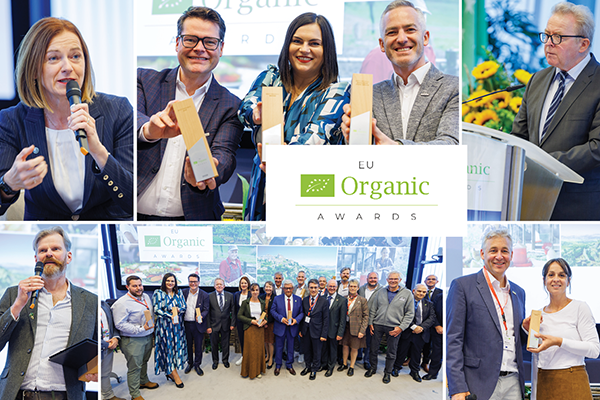 Celebrating the best of organic farming and food
Celebrating the best of organic farming and food29 September 2023
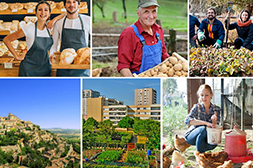 EU Organic Awards
EU Organic Awards24 March 2022
 EU organic action plan – what's on the plate?
EU organic action plan – what's on the plate?1 April 2021
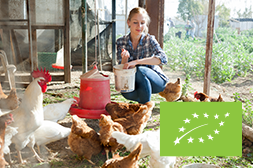 Strengthening the EU organic label
Strengthening the EU organic label18 March 2021
 Building trust in organic farming in Europe
Building trust in organic farming in Europe11 March 2021
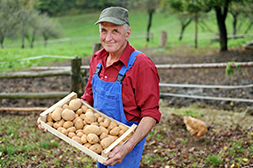 Introducing organics
Introducing organics4 March 2021
Documents
- 20 JANUARY 2025
- 14 JANUARY 2025
- български(248.7 KB - PDF)
- español(203.56 KB - PDF)
- čeština(265.33 KB - PDF)
- dansk(201.73 KB - PDF)
- Deutsch(206.06 KB - PDF)
- eesti(253.42 KB - PDF)
- ελληνικά(269.75 KB - PDF)
- français(196.91 KB - PDF)
- Gaeilge(201.48 KB - PDF)
- hrvatski(267.87 KB - PDF)
- italiano(199.87 KB - PDF)
- latviešu(246.07 KB - PDF)
- lietuvių(266.76 KB - PDF)
- magyar(255.27 KB - PDF)
- Malti(280.31 KB - PDF)
- Nederlands(201.13 KB - PDF)
- polski(258.17 KB - PDF)
- português(205.87 KB - PDF)
- română(246.59 KB - PDF)
- slovenčina(276.43 KB - PDF)
- slovenščina(262.41 KB - PDF)
- suomi(197.16 KB - PDF)
- svenska(198.99 KB - PDF)
- 14 JANUARY 2025
- български(244.71 KB - PDF)
- español(184.52 KB - PDF)
- čeština(232.26 KB - PDF)
- dansk(179.86 KB - PDF)
- Deutsch(188.31 KB - PDF)
- eesti(201.75 KB - PDF)
- ελληνικά(245.82 KB - PDF)
- français(185.33 KB - PDF)
- Gaeilge(182.74 KB - PDF)
- hrvatski(230.96 KB - PDF)
- italiano(180.14 KB - PDF)
- latviešu(260.77 KB - PDF)
- lietuvių(245.06 KB - PDF)
- magyar(247.43 KB - PDF)
- Malti(249.79 KB - PDF)
- Nederlands(182.24 KB - PDF)
- polski(262.79 KB - PDF)
- português(185.37 KB - PDF)
- română(229.57 KB - PDF)
- slovenčina(237.98 KB - PDF)
- slovenščina(229.05 KB - PDF)
- suomi(178.03 KB - PDF)
- svenska(176.84 KB - PDF)
Related links
At a glance information on EU organic policy, the organic logo and legislation relating to the organic sector, as well as frequently asked questions.
This plan aims to drive investment and innovation in organic farming and boost demand for organic food. Check out what has been achieved so far.
Information on the new organic legislation in force since January 2022, the consultation that was held about the new law and the action plan for organics.
Policy, rules, organic certifications, support and criteria for organic farming.



